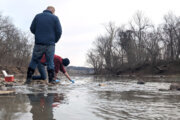The president of the American Academy of Pediatrics isn’t happy with vaccination rates among youngsters and said doctors are “absolutely concerned” about rising cases of COVID-19 among adolescents.
Speaking during a webinar hosted Aug. 4 by the COVID-19 Vaccine Education and Equity Project, Dr. Lee Savio Beers said with the rise of the delta variant, pediatric cases of COVID-19 are nearly doubling week over week.
“We’re hearing from the ground from our pediatricians who are seeing patients in their practices and in their hospitals, that they are seeing a lot of very sick kids. So we are absolutely concerned,” Beers said.
Beers also is a professor of pediatrics and medical director for Community Health and Advocacy at Children’s National Hospital.
She said about 27% of 12-to-15-year-olds are fully vaccinated, and about 39% of 16-to-17-year-olds are immunized.
“Getting our adolescents immunized against COVID-19 really is more important than ever. It’s a safe and effective vaccine. And it’s important,” she said.
Beers notes that many adolescents tend to respond less to messaging about their own personal health. What’s really important to them is how being vaccinated helps protect others and their community.
“For parents, actually, they want to hear that their kids are going to be protected, but for the adolescent, they do care about protecting their community. And it’s also important for us to remember that younger children are not yet eligible for the vaccine. So when eligible adults and adolescents are immunized, we’re also helping to protect our little ones,” she said.
Dr. Anthony Fauci, the nation’s lead infectious disease expert who also attended the webinar, as part of a prerecorded segment, said there are a number of reasons parents should have children vaccinated as soon as they become eligible.
“You don’t want a child who might get infected and have no symptoms — because very often, children get infected they don’t get any symptoms — then inadvertently and innocently bring it home to grandparents who might be elderly, who might have an underlying condition or a member of the family that might be on cancer chemotherapy. So you don’t want spread of infection and you don’t want the child, him or herself, to get sick,” said Fauci, director of the National Institutes of Health’s National Institute of Allergy and Infectious Diseases and chief medical adviser on COVID-19 to President Joe Biden.
Fauci expressed concern about COVID-19’s lingering effects.
“We’re seeing now that a substantial proportion of people who get infected, even if they have mild symptoms, can have what’s called long COVID, which is the persistence of symptomatology, often measured in several months,” he said.
Fauci added: “Then you find that as a matter of fact, when you clear the virus, you can have persistence of profound fatigue that interferes with your function — muscle aches, temperature dysregulation, sleep disorders, and something which people refer to as brain fog, or the inability to focus or to concentrate normally.”








